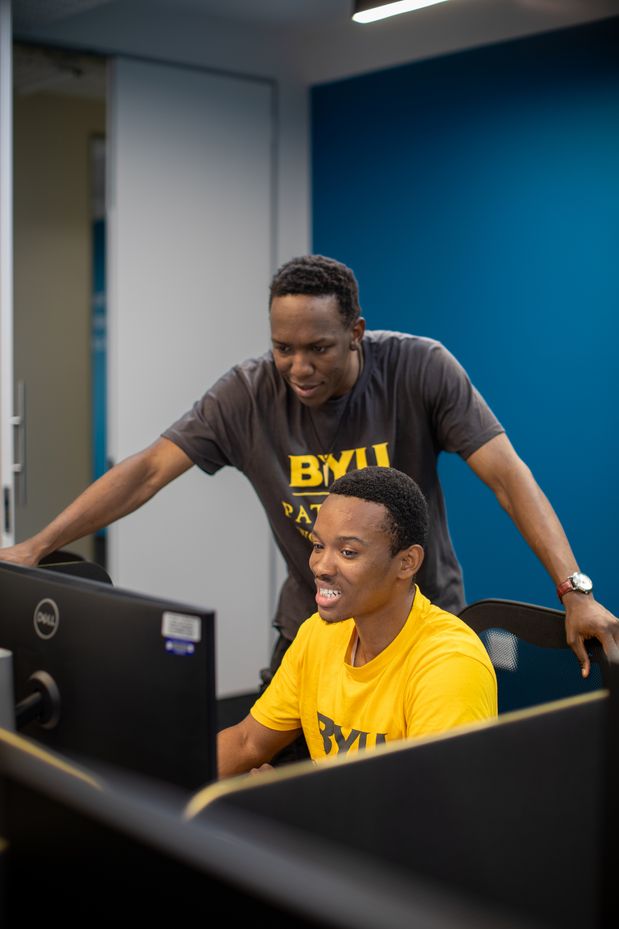
For aspiring college students who don’t think they have the time or money to earn a four-year degree — has the Brigham Young University system got a deal for you.
At BYU-Pathway Worldwide, home of the nation’s first U.S.-accredited 90-credit bachelor’s degree, students may obtain their B.A. in three years instead of four at a cost of $6,300.
That’s not $6,300 per year. That’s $6,300 in total. And for international students, it’s even cheaper.
“You can earn a B.A. in the U.S. for $6,300,” Brian Ashton, president of BYU-Pathway Worldwide, told The Washington Times. “Internationally, it’s around $2,000 typically, and in Africa it’s as low as $300 for an entire bachelor’s degree.”
Faith-based colleges typically charge less than their secular brethren, and BYU-Pathway is certainly religious. The online program is part of the Church of Jesus Christ of Latter-day Saints’ Church Educational System, which includes traditional BYU campuses in Utah, Hawaii and Idaho.
The shockingly low price provides a dramatic example of the growing divide over cost in higher education. Some religious schools have moved to increase their accessibility by eliminating tuition, even as elite institutions push the envelope on how much they can charge.
Wellesley College in Massachusetts was recently credited with being the first U.S. educational institution to cross the $100,000 threshold by setting its total annual cost for the 2025-26 academic year at $100,541.
In other words, for the price of attending Wellesley for one year, you could earn 15 bachelor’s degrees via BYU-Pathway — with a few thousand bucks to spare.
Clark Gilbert, the LDS education commissioner, said the idea was to create an affordable, spiritually based program for those often priced out of the education market, including low-income adults and first-generation college students.
“Yes, we’re trying to innovate, and the 90-credit degree is innovative, but at the heart of this was, how do we serve a population that just doesn’t have opportunity?” Mr. Gilbert said. “Not as a consumer model, not even as an education-system model, but from a pastoral duty of care, we felt like we had to come up with new ways to approach higher education.”
From its inception in 2009, BYU-Pathway has sought to remove what its founders identified as the three main barriers to a college education: the expense, time commitment, and would-be students’ lack of confidence.
“We came in right out of the gate and priced ourselves at about half the price of a traditional U.S. community college,” said Mr. Gilbert.
He said one reason for the low cost is that the church underwrites the fixed costs, such as administration and curriculum, but the expense-cutting doesn’t stop there.
“Our cost structure is very low. We use adjunct instructors. We’re purely online. We don’t have a campus. We hire our students to do work for us,” said Mr. Ashton.
Last year, the school was able to reach new lows by pioneering the 90-credit degree, an alternative to the 120-credit program that typically takes four years to complete. That let the program slash its price by 25%.
How did it do it? School officials shaved off the fourth year largely by eliminating elective requirements, which most of their students were putting off until their final year anyway.
“Most of them were working adults with lots of life experience. The idea of having to wait around for another year just to take electives when their lives were full of amazing experiences led us to this,” said Mr. Gilbert. “All we did was truncate some of the elective curriculum that we felt many of these adult learners already had in their lives.”
The Northwest Commission on Colleges and Universities, the higher-education accreditor in states including Idaho and Utah, approved the BYU-Pathway accelerated degree last year as a pilot program.
“I think they were very supportive because we had a long history of quality education,” Mr. Gilbert said. “We were not a diploma mill. We were not just trying to make money off students. In fact, the opposite. So there was a lot of trust with BYU-Pathway.”
The program was aided by its connection to the College-in-3 Exchange, an initiative led by University of Pennsylvania professor Robert Zemsky that promotes the accelerated degree as a way to “increase student success while decreasing student costs.”
Students at BYU-Pathway receive their degrees from BYU-Idaho in Rexburg and Ensign College in Salt Lake City, both part of the College-in-3 Exchange.
“We were a good test case,” said Mr. Gilbert. “A lot of other schools are cheering for us to do well on this because they’d like to follow.”
Not surprisingly, the 90-credit degree has proved popular with students. The school saw a 15% jump in enrollment immediately after unveiling the three-year program.
“We’ve also found it has encouraged retention. As people see that ‘hey, I can be done in three years,’ they’re more willing to stay,” said Mr. Ashton. “Our retention in Africa, for example, is similar to our retention in the U.S., even though our population of students in Africa is much riskier. It’s had tremendous outcomes and benefits that we just continue to see.”
The degree may be inexpensive, but is it worth it? Mr. Ashton and Mr. Gilbert, both of whom hold MBA degrees from Harvard Business School, said BYU-Pathway grads test as well as in-person students at Ensign and BYU-Idaho.
“We use the same content, the same assessments, the same learning outcomes as our university campuses. It’s just delivered through a channel that’s much more efficient,” said Mr. Gilbert, who previously taught at Harvard Business School. “But when the students are done, they perform at the same level as students who come to our university campuses.”
The nonprofit program has about 75,000 students enrolled in the U.S. and globally, including in Nigeria, the Philippines, Brazil and Mexico.
“It’s working all around the world,” said Mr. Gilbert. “And one of the miracles is that it’s given people confidence who didn’t think education was a possibility at all.”












